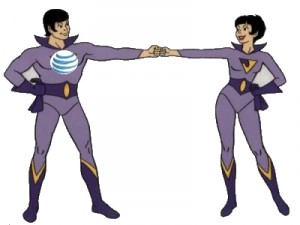
Wonder Twins: AT&T and Wall Street team up to support Internet Overcharging. "Shape of usage caps, form of ripping broadband users off."
The Wall Street Journal has left its readers with the impression America is the last bastion of the unlimited, all you can use, broadband plan.
In a story for the Dow Jones Newswires, Roger Cheng reports AT&T’s imposition of data caps and other Internet Overcharging schemes “is the latest step taken to get people out of the mindset that online access is an all-you-can-eat buffet. It’s part of a broader shift by companies on both the wireless and fixed-line sides to get consumers comfortable with a usage-based pricing model, in line with how the service is delivered elsewhere around the world.”
But that statement is provably inaccurate. In fact, usage limits and so-called “usage-based pricing” is a phenomenon growing mostly in under-competitive markets in North America.
As Stop the Cap! has reported over the past few years, while the rest of the world is moving away from these usage-limited plans, providers in the United States and Canada are seeking to impose them to boost profits and monetize broadband traffic. Some are even exploring charging you based on individual web applications and websites visited.
At the same time Korea is moving towards delivering 1Gbps unlimited broadband to every resident by 2013, American providers are trying to limit the broadband party to protect their own business interests. In Canada, AT&T’s counterpart Bell was caught distorting the record on why it wanted to cease unlimited access, eventually admitting it was about getting users to reduce usage, particularly of video services which compete against its own pay television product. Shaw Cable was caught lowering usage allowances when the threat of Netflix arrived in Canada. So did Rogers Cable.
Around the world, usage-limited broadband is either yesterday’s story, or will be soon:
- The Philippines fought off unjustified efforts to impose usage limits on broadband service to boost provider profits. So did Malaysia.
- Australian providers forced to impose caps because of undersea fiber capacity issues are relaxing them as capacity increases.
- Australia’s government has made abolishing data caps a national priority with its National Broadband Network, because they harm innovation and entrepreneurship.
- In New Zealand, providers and government officials have made it clear, “we hate data caps,” and they are benefiting from new underseas fiber that will eliminate them once and for all;
- In South Africa, MWEB abolished usage limits and now waits for additional underseas cable projects to finish before boosting speeds.
- Just this week, BT in the United Kingdom joined a parade of other providers eliminating usage caps on its broadband service.
Make no mistake: every survey ever conducted on this issue shows consumers loathe Internet Overcharging schemes and prefer unlimited access usage plans, particularly for wired broadband:
- In Europe, where unlimited access plans are already available on the wired side, consumers there now want limits also lifted on mobile networks;
- In the United States, Americans despise usage capped broadband;
- Another survey shows usage caps alienate providers’ best customers;
It’s no wonder telecommunications companies rival big banks among the Wall Street Cheat Sheet’s 18 Most Hated Companies. Among the despised: AT&T, Comcast, Time Warner Cable, Cox Cable and Charter Communications.
Why? Pricing and usage caps are covered among the reasons.
Despite the overwhelming evidence to the contrary, Wall Street analysts joined AT&T’s chorus claiming such usage capped broadband was the wave of the future:
- DISTORTED CLAIM: “All-you-can-eat is a uniquely American service,” said Dan Hays, who covers telecom for consultancy PRTM. Consumers, who have enjoyed years of flat-rate pricing for Internet, may have a hard time accepting limits on their landline service, analysts said.
- BROKEN RECORD: “We expect the cable operators to follow AT&T’s move by introducing pricing plans that include caps for lower end packages,” said Craig Moffett, analyst at Sanford C. Bernstein & Co. Moffett said the logical reaction to more cord-cutting would be usage-based pricing.
Hays is provably wrong on his claim unlimited access is “uniquely American.”
Moffett said precisely the same thing in December (and earlier) when Net Neutrality was halfheartedly adopted at the FCC. He had called for these pricing schemes in the past and will continue to do so.
Both of these analysts work for companies who favor the higher profits Internet Overcharging will bring providers (and their investing clients), so it’s no surprise both are willing to cheerlead price hikes. But readers are left in the dark as both are quoted with the impression they are independent observers with no interest in the outcome.
As for the impact on consumers, nobody from the Wall Street Journal bothered to talk to any to find out.
What AT&T has proven, yet again, is that American broadband is moving backwards to enhance their profits as the rest of the world advances.


 Subscribe
Subscribe

I love when they tell me less is more.
Freedom for corporations, tyranny for consumers
What meaning does the speed of your connection have if the bandwidth is capped?
What meaning does a “generous” cap of 250 GB have when bandwidth is growing at roughly the same kinds of rates as disk / storage?
We have long had the worst access in the world. It’s proof that in the Greed vs Humanity debate, Greed is winning the battle and destroying the fabric.